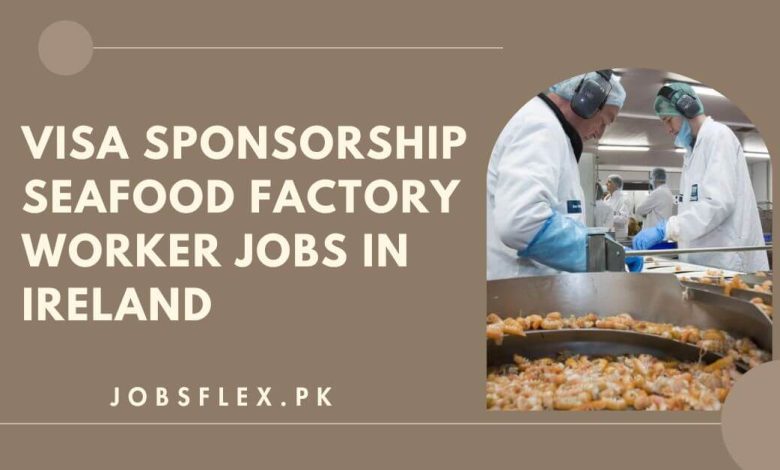Visa Sponsorship Seafood Factory Worker Jobs in Ireland 2025

Ireland, known for its breathtaking landscapes and vibrant cultural heritage, has also emerged as a hub for exciting job opportunities. Among these are positions as seafood factory workers, offering the chance to work in a thriving industry while experiencing life in one of Europe’s most beautiful countries.
If you have a passion for the ocean and an interest in contributing to the growing seafood sector, a job in Ireland’s seafood factories might be perfect for you. This guide provides comprehensive details on the role, requirements, benefits, and application process, ensuring you’re fully prepared for this opportunity.
Check Also: Gardener Jobs in Australia for Foreigners – Apply Now
Job Overview:
- Location: Ireland (Note: Ireland is an independent country and not part of the UK.)
- Industry: Seafood Processing and Manufacturing
- Position: Factory Worker
- Experience Required: Minimum 1 year preferred
- Language Requirement: Basic proficiency in English
- Age Requirement: None
- Visa Sponsorship: Available
- Relocation Assistance: Yes (Accommodation not provided)
- Employment Type: Temporary and Full-time
- Hourly Salary: €11 (According to industry standards)
Industry Insights and Career Growth:
The Irish seafood industry is a vital part of the national economy, contributing significantly to exports and local employment. According to Bord Iascaigh Mhara (BIM), Ireland’s seafood industry was valued at over €1.2 billion in recent years, reflecting its stability and growth potential.
Working in this industry not only provides job stability but also opportunities for career advancement. Many factory workers progress to supervisory or management roles as they gain experience and skills. Additionally, visa sponsorship makes it easier for international applicants to pursue these career paths.
Requirements:
To succeed as a seafood factory worker in Ireland, you’ll need to meet the following requirements:
- Education and Experience: While some roles require at least one year of experience, entry-level positions are available for those willing to learn on the job.
- Physical Fitness: The work is physically demanding, involving long periods of standing, heavy lifting, and working in cold environments.
- Teamwork and Flexibility: Collaboration and adaptability are crucial, especially during peak processing periods.
- Hygiene Standards and Safety Compliance: Strict adherence to hygiene and safety protocols is mandatory to ensure product quality and workplace safety.
Job Duties and Responsibilities:
As a seafood factory worker, your responsibilities will include:
- Seafood Preparation: Cleaning, processing, and preparing seafood products while maintaining high standards of freshness and quality.
- Packaging and Labelling: Accurately weighing and labeling products to comply with industry regulations.
- Sanitization and Safety: Practicing rigorous hygiene standards and using protective equipment to maintain a safe work environment.
- Team Collaboration: Working closely with team members to meet production targets efficiently.
Benefits:
Working as a seafood factory worker in Ireland offers numerous benefits:
- Visa Sponsorship:
Facilitates international relocation by simplifying the visa application process. - Career Growth:
Opportunities for promotion to supervisory or managerial roles. - Cultural Experience:
Exposure to Irish culture, including traditional music, festivals, and cuisine. - Scenic Surroundings:
Enjoy Ireland’s stunning landscapes, from coastal cliffs to lush green hills.
How to Apply for Visa Sponsorship Seafood Factory Worker Jobs in Ireland 2025?
Here are the steps to apply for these jobs:
- Research Reliable Job Portals: Use trusted websites like Jobs.ie or IrishJobs to find openings.
- Prepare Your CV and Documents: Ensure your CV is tailored to highlight relevant experience. Include necessary documents, such as proof of work experience and passport copies.
- Submit Your Application: Follow the application instructions carefully, paying attention to deadlines and document requirements.
- Prepare for Interviews: Be ready for virtual or in-person interviews, focusing on questions about teamwork, physical fitness, and adherence to safety standards.
Living and Working in Ireland: Practical Tips
- Cost of Living: Average monthly expenses range from €800 to €1,200, depending on location.
- Cultural Adaptation: Embrace local customs, be open to social interactions, and consider learning a few Irish phrases.
- Healthcare and Transport: Familiarize yourself with the Irish healthcare system and local transport options for commuting convenience.
Conclusion:
Seafood factory worker jobs in Ireland provide a unique blend of career growth, cultural exposure, and scenic beauty. With visa sponsorship available, this is an excellent opportunity for international applicants seeking both professional and personal development.
Ready to take the plunge? Start your application today and embark on a fulfilling journey in Ireland’s dynamic seafood industry
Frequently Asked Questions:
-
What is a seafood operator?
Fish and seafood processing and packaging machine operators Set up and operate machines that process fish and seafood products. Check the products and packaging for irregularities. Ensure compliance with company standards. Make the necessary adjustments to the machines.
-
What are the techniques used in seafood processing?
The four basic procedures used in the final processing of fish products are heating, freezing, controlling water activity (by drying or adding chemicals), and irradiating. All of these procedures improve the fish’s shelf life by inhibiting the mechanisms that promote spoilage and degradation.
-
What are the duties of a seafood processor?
The processor is responsible for converting raw fish products into a processed, high-quality product ready for sale. The processor may sort fish by species, tend and operate machines, hand fillet whole fish and inspect the product to meet CAPS standards of quality.



